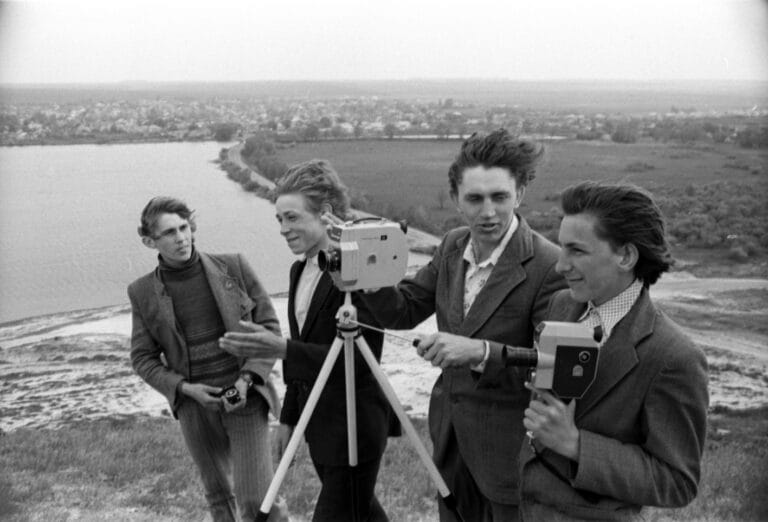- Title:
Bilka, ‘Murator’ People’s Studio Film
- Author:
- Year:
- 1980s
- See more:
- Urban Media Archive
- Original language:
- Ukrainian
Related sources:

Roman Buchko on Soviet Film Amateurs: Excerpt from an Interview on November 1, 2012
Comment will follow...
The early vision of amateur filmmaking in the Soviet Union was characterized by the pragmatic idea of using the new media not only for entertainment but also to involve a wide range of citizens in the production of newsreels and to create a network of correspondents across the country to cover the construction of socialism. However, despite sporadic attempts, this idea was not immediately implemented on a large scale. The lack of technology and sufficient equipment, and later the political climate of the 1930s, hindered this. It was only after liberalization and Khrushchev's reforms that the idea reappeared on the agenda.
Worked on the material:
- Research
Oleksandr Makhanets
- Visual Laboratory Seminar, comment
Oleksandr Makhanets, Bohdan Shumylovych, Anastasiya Kholyavka, Ivanna Cherchovych
- Subtitles to the film
Vitalii Pavliuk
Comments and discussions


A film by amateur filmmaker Roman Buchko, co-directed with Volodymyr Bordiuk and Roman Chyzhyk. The film is named after the Bilka River in Lviv Oblast, a right tributary of the Poltva (Vistula River basin). It was created at the Murator People’s Film Studio of the Lviv House of Culture of Builders. The triple authorship reflects the specifics of amateur filmmaking in the USSR, where any amateur activity had to be collective. The chosen topic and content of the work were characteristic of Roman Buchko, who systematically worked with this theme. Buchko hailed from the area depicted in the film, the village of Hai, near Zvenyhorod. Noteworthy is that Volodymyr Bordiuk, head of the city film club in Lviv, was responsible for the activities of amateur filmmakers and resource distribution. Although Bordiuk’s direct involvement in the film’s creation is unclear, his name among the authors likely helped legitimize the work before the authorities.
The film tells the story of a river narrated by a young girl who describes how her life changed when people altered its natural course for irrigation in rural industry. To illustrate this, the author experiments with shooting and double exposure, showing an overlap of a landscape with a small river and a portrait of a girl whose face gradually changes along the film. At the beginning, she is smiling; by the end, her face is sad. The river serves as a broad metaphor for environmental pollution, the neglect of nature, and the loss of human connection with the environment.
The environmental theme was popular in late modernist cinema and particularly important to Buchko, who organized environmental film festivals to raise awareness. In the Soviet Union, ecology was one of the few topics available for criticism. Obviously, this criticism had to be dosed, primarily by self-censorship of authors who living in a country of total control understood to what extent and how they could criticize. In the film, the criticism is not so much addressed to the collective power as it is directed at modern men (of Soviet modernism?) and their treatment of nature.
The film includes footage from archaeological excavations of the historic settlement of Zvenyhorod near the modern village of Davydiv in Lviv Oblast, where the Bilka River flows. This connection to history romanticizes the past. Zvenyhorod, as the capital of one of the ancient Rus’ principalities, was significant in Soviet historiography, supporting the narrative of Western Ukrainian lands’ belonging to the Ukrainian SSR. It also held importance for Ukrainian national historiography, allowing Buchko to create an ambiguous reading. The theme of Rus’ history and its connection with nature is reinforced by Mykola Vingranovskyi’s poem Blue Sisters of Men (1967). Buchko, acquainted with the poet and part of the Sixties and dissident circles, likely chose this poem intentionally.
The film was probably screened only at internal republican venues and local environmental film festivals organized by Buchko. This is suggested by the fact that the film is in Ukrainian; works intended for all-Union competitions were usually made in Russian. For example, the film Wild Honey, co-authored by Buchko, Bordiuk, and Chyzhyk, was made in Russian.